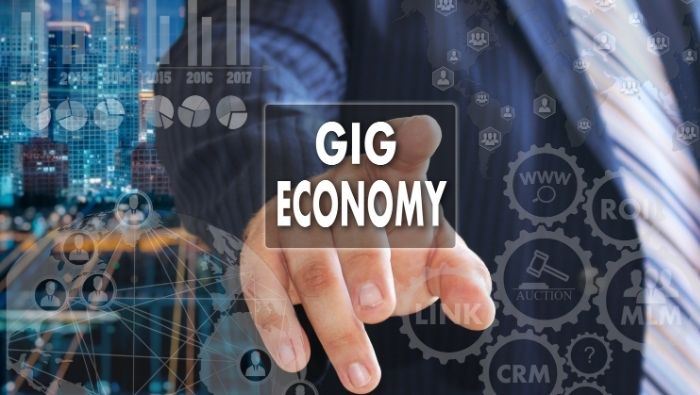What You Need to Know If You Work In The Gig Economy
by Gary Foreman

Yes, the gig economy can offer freedom, but it’s not the same as drawing a paycheck. Here’s some things you need to be aware of if you work in the gig economy.
In some ways, the so-called gig economy is a throwback to an earlier era. In other ways, it’s a brand new thing fueled by technology. In any case, it’s big and growing fast. It’s estimated that 43% of all workers had some participation in the gig economy in 2020.
But even though many of us have participated in the gig economy, we’re still trying to define and understand it. To help us understand some of the financial aspects of the gig economy we turned to Jim White. Jim is a Certified Financial Planner and responsible for Great Oak Wealth Management in Pottstown and Malvern, PA.
Q: Working in the gig economy can create some additional tax responsibilities. What are they? And, what’s the best way for a gig economy worker to fulfill those tax responsibilities?
Mr. White: As a self-employed person, the income you receive does not have taxes withheld. It is now your responsibility to keep track of your taxable income. Taxable income is your revenue minus your expenses and allowable deductions. It is important to either learn basic accounting or better yet hire an accountant. You don’t want to pay too much or too little tax – you want it just right.
Unfortunately, in addition to your income tax you are responsible for self-employment (SE) tax. SE tax is Social Security and Medicare tax for the self-employed. Just like you don’t have income tax withheld, you do not have Medicare and Social Security taxes withheld either. To add insult to injury when you’re an employee of a company, you pay a portion, and the company you work for pays a portion of the tax. When you’re self-employed, you’re on the hook for both.
It’s also important to note the IRS, State Treasury, and local government do not want to wait until April 15 to collect their taxes. They encourage you, through penalties, to pay quarterly. It is in your best interest to have your taxable income carefully estimated each quarter and payment sent to each respective agency.
Organization and good record keeping are imperative. I’ve seen well run, successful businesses undermined by tax problems.
Start living better for less.
Subscribe to get money-saving content by email that can help you stretch your dollars further.
Twice each week you'll receive articles and tips that can help you free up and keep more of your hard-earned money, even on the tightest of budgets.
Subscribers receive a free copy of our eBook Little Luxuries: 130 Ways to Live Better for Less.
We respect your privacy. Unsubscribe at any time.
Q: Many in the gig economy do not receive checks for their work. Often they’re paid in cash, via PayPal or even crypto-currencies. Is that income always taxable?
Mr. White: All cash or digital currency received for goods or services you provide are considered taxable income. Just because you do not get a tax form such as a 1099 or W-2 for that income, does not mean that income is not taxable.
Besides the fact that not reporting cash payments is income tax fraud, what happens if you want to buy a car, rent or purchase a home, collect Social Security or contribute to a retirement plan? If you have no reportable income, you can forget it.
Q: So-called fringe benefits can fall by the wayside for people working in the gig economy. Why is it important not to overlook these benefits?
Mr. White: A comprehensive plan of fringe benefits is not something you should shortchange. You need to design a benefit plan that protects both you and your family from financial disaster. Often, due to cost, lack of time to do research, and/or lack of knowledge of the benefit, this gets put off for another day.
I’m not just talking about the most obvious one, a good health insurance policy that will save you in the case of illness or injury, but those benefits companies provide that you probably don’t think too much about, life and disability insurance.
If you die and you’re part of the gig economy, your income disappears. Life insurance can be used to protect your family in case of your untimely demise. You should have enough coverage to replace your income, retirement savings, and cover some of the significant expenses and debt throughout your life. A good term policy should do the trick. (See How Much Life Insurance Do You Need? A Checklist.)
If you become disabled and can’t work, you won’t get paid. Disability insurance can help get through an illness and recovery, and although it won’t replace your entire income, it may be able to soften the blow.
The fact is, working in the gig economy increases your financial risk. A lot may be riding on your income. A medical emergency, disability, or something worse can be devastating. That’s why you need to diversify that risk through a comprehensive benefits plan.
Q: What about retirement plans? Do people who work in the gig economy have the same options as other workers?
Mr. White: The best thing about working in the gig economy besides being your own boss and setting your own hours are your retirement plan options. You have more options than other workers have. It could be as simple as a Traditional or Roth IRA or setting up small business retirement options such as a SEP IRA, Simple IRA or Solo 401K.
The best solution depends on your situation. Often I have clients that end up having multiple retirement plans because in year one Option A may be more beneficial, but in year two Option B may be better. The flexibility of the gig economy carries over to retirement plans as well. It’s important you do your research or meet with a professional to determine your best course of action when it comes to saving for retirement in the gig economy.
Q: Some retirees look for part-time work. What should they know about the gig economy?
Mr. White: The best part about retirees participating in the gig economy is the flexibility it allows. If a retiree wants to work just a day or two a week or a few days a month, they can do that.
If you want to travel a bit and earn an income, you can work in the gig economy just about anywhere. You don’t have to worry about the gig economy tying you down to one location.
Working in the gig economy may be a good option if you want to delay collecting Social Security or if you’re afraid you’ll run out of retirement funds. Getting some additional income to supplement your retirement withdrawals may improve the likelihood you don’t outlive your money.
Reviewed October 2021
About the Author
Gary Foreman is the former owner and editor of The Dollar Stretcher. He's the author of How to Conquer Debt No Matter How Much You Have and has been featured in MSN Money, Yahoo Finance, Fox Business, The Nightly Business Report, US News Money, Credit.com and CreditCards.com.
Popular Articles
- 7 Habits of Highly Frugal People
- 5 Simple Budget Cuts That Can Save $200 a Month
- How to Track Down Unclaimed Funds Owed You
- 32 Ways to Save Money on Your Utility Bills
- Do You Need Credit Life Insurance When Buying a New Car?
- How to Maximize Profits When Selling Online
- Staying Motivated to Continue Digging Yourself Out of Debt
On After50Finances.com
- 9 Things You Need to Do Before You Retire
- You Didn’t Save Enough for Retirement and You’re 55+
- When Empty Nesters Reorganize and Declutter Their Home
- Reinventing Your Career in Your 50s or 60s
- What Mature Homeowners Should Know about Reverse Mortgages
- 2 Reasons to Collect Social Security Benefits As Soon As Possible


